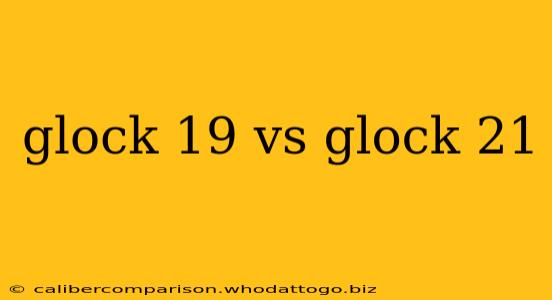Choosing the right handgun is a deeply personal decision, influenced by factors like intended use, hand size, and personal preference. This in-depth comparison of the Glock 19 and Glock 21 aims to illuminate the key differences between these two popular Glock models, helping you make an informed choice.
Glock 19: The Compact Champion
The Glock 19 is a compact, 9mm pistol renowned for its reliability, concealability, and manageable recoil. It's a favorite among law enforcement and civilians alike, often chosen for concealed carry and personal defense.
Advantages of the Glock 19:
- Concealability: Its smaller size and lighter weight make it ideal for concealed carry. It's easily hidden under clothing, making it a discreet self-defense option.
- Ammunition Capacity: Standard Glock 19 magazines hold 15 rounds of 9mm ammunition, providing ample firepower in a defensive situation. Extended magazines are also readily available, increasing capacity further.
- Recoil Management: The 9mm cartridge produces less recoil than the .45 ACP, making the Glock 19 easier to shoot accurately, particularly for those with less experience.
- Versatility: The Glock 19's compact size doesn't compromise its versatility. It performs well in various situations, from close-quarters self-defense to range practice.
- Cost-Effectiveness: 9mm ammunition is generally more affordable than .45 ACP, making range practice and training more economical.
Disadvantages of the Glock 19:
- Caliber: Some shooters prefer the stopping power of larger calibers like .45 ACP. While 9mm is highly effective, the .45 ACP is perceived by some as offering greater one-shot stopping potential.
- Capacity Limitations (Compared to Larger Models): While 15 rounds is substantial, larger capacity pistols are available.
Glock 21: The Full-Size .45 ACP
The Glock 21 is a full-size pistol chambered in .45 ACP, offering significant stopping power. It's often preferred by those prioritizing maximum firepower and a substantial cartridge.
Advantages of the Glock 21:
- Caliber: The .45 ACP cartridge is known for its stopping power, making it a popular choice for self-defense.
- Felt Recoil: While some find the recoil manageable, others appreciate the more pronounced recoil as providing increased feedback.
- Stopping Power: The .45 ACP is generally considered to have superior stopping power compared to 9mm, although the effectiveness of any cartridge depends on shot placement.
Disadvantages of the Glock 21:
- Size and Weight: The Glock 21 is significantly larger and heavier than the Glock 19, making it less suitable for concealed carry for many individuals.
- Recoil: The .45 ACP cartridge's heavier recoil can make it challenging for some shooters, especially those with less experience or smaller hands.
- Ammunition Cost: .45 ACP ammunition is generally more expensive than 9mm.
- Capacity: While it holds a respectable number of rounds, the lower magazine capacity compared to high-capacity 9mm pistols is a consideration.
The Verdict: Which Glock is Right for You?
The best choice between the Glock 19 and Glock 21 depends entirely on your individual needs and priorities.
-
Choose the Glock 19 if: You prioritize concealability, affordability, manageable recoil, and versatility. It's an excellent choice for concealed carry and everyday self-defense.
-
Choose the Glock 21 if: Stopping power is your top priority, and you're less concerned about concealability and the higher cost of ammunition. This is a more suitable option for home defense or range shooting where concealability isn't a primary factor.
Ultimately, the best way to decide is to handle both firearms, if possible, and consider your individual needs and preferences. Visiting a local gun range and renting both pistols is highly recommended before committing to a purchase. Remember to always practice safe gun handling and follow all relevant laws and regulations.

